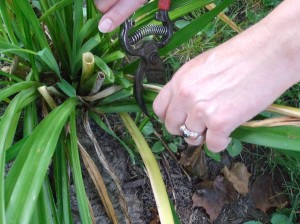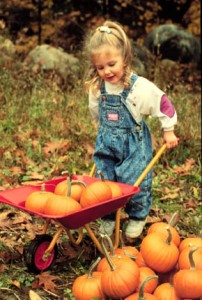Indoors
- Keep poinsettia in dark for 15 hours a day for eight to 10 weeks until red bracts begin to show.
- Houseplants may drop leaves, especially if they spent the summer outdoors. This a natural reaction to reduced light.
- Water indoor plants less frequently and discontinue fertilizing as growth slows or stops.
General landscape
- Continue watering gardens, shrubs and trees if rainfall doesn’t reach an inch or more every week or 10 days. It’s important for plants to go into cold weather with adequate moisture.
- Erect physical barriers around woody plants and trees if rabbits, rodents or deer are a problem. Metal mesh (1/4-inch) hardware cloth is good for this. Pull mulch away from trunks to discourage rodents from making a winter home there.
- Spray evergreens, including newly planted ones, with an antidesiccant when temperature is above 40 degrees F. These products protect plants from drying out.
- Rake or shred tree leaves, especially large ones like maple and sycamore, to prevent them from matting down and smothering grass. Compost leaves and other plant debris.
- Continue mowing lawn as needed.
- Remove plant debris from the garden to protect next year’s plantings from insect and disease build up.
Cut back perennials, such as daylily, iris and peony or other plants that have been damaged by frosts or freezes.
- Prepare new beds now for planting next spring. The soil is usually easier to work in the fall and fall-prepared beds allow for earlier plantings in spring. Beds may be mulched with compost, chopped leaves or other organic material during the winter, if desired. Avoid fall tilling when there’s a chance of soil erosion.
- Apply a layer of organic materials to garden beds in the fall. This includes rotted or composted manure, compost, chopped leaves or a slow-release organic fertilizer.
- Plant, divide or transplant perennials.
- Have soil ready to mound on roses for winter protection. Do not mound or cover roses until after the leaves drop and the soil is near freezing, usually late November or early December.
- Dig tender garden bulbs for winter storage. Gladiolus corms should be dug when leaves begin to yellow. Caladiums and tuberous begonias should be dug before a killing frost. Dig canna and dahlia roots after a heavy frost. Allow to air dry, pack in dry peat moss or vermiculite and store in cool location.
- Continue planting spring bulbs as long as soil can be worked. Make sure to water well.
Vegetables and fruits
- Harvest root crops and store in a cold (32 degree) humid location. Storing produce in perforated plastic bags is a convenient and easy way to increase humidity.
- Harvest Brussels sprouts as they develop in the axils of the leaves from the bottom of the stem. The sprouts will continue to develop up the stem.
Harvest pumpkins and winter squash before frost, but when the rind is hard and fully colored. Store in a cool location until ready to use.
- Harvest gourds when stems begin to brown and dry. Cure at 70 to 80 degrees two to four weeks.
- Harvest mature, green tomatoes before frost and ripen indoors in the dark.
- Asparagus top growth should not be removed until foliage yellows. Let foliage stand over winter to collect snow for insulation and moisture.
- Apply mulch to strawberries to prevent winter injury or kill to crowns.
- Strawberry plants need protection from winter extremes. Apply winter protection when plants are dormant but before temperatures drop below 20 degrees, usually late November or early December.


I am so glad you are continuing with your column this way. Too bad the Star felt the need to spend so much space to food and beer regularly instead. At least I can still get my gardening “fix”.
Love your new newsletter! Look forward to receiving
the next edition!
– sure do miss your column in the Star and so glad I subscribed to your newsletter- I love it !
thank you!!!!!
Thanks for Fall info. What about raspberries?
Anything special?
Hi, Gregg — here you go. https://www.purdue.edu/hla/sites/yardandgarden/extpub/raspberries/
Thank you Beverly. Hope you and Ed are well.
Always good information in your newsletters. Thank you!
Also, I think you should live on the edge and paint your front door!
Thank you so much!
Thanks, Susie.
You are welcome, Jessey.